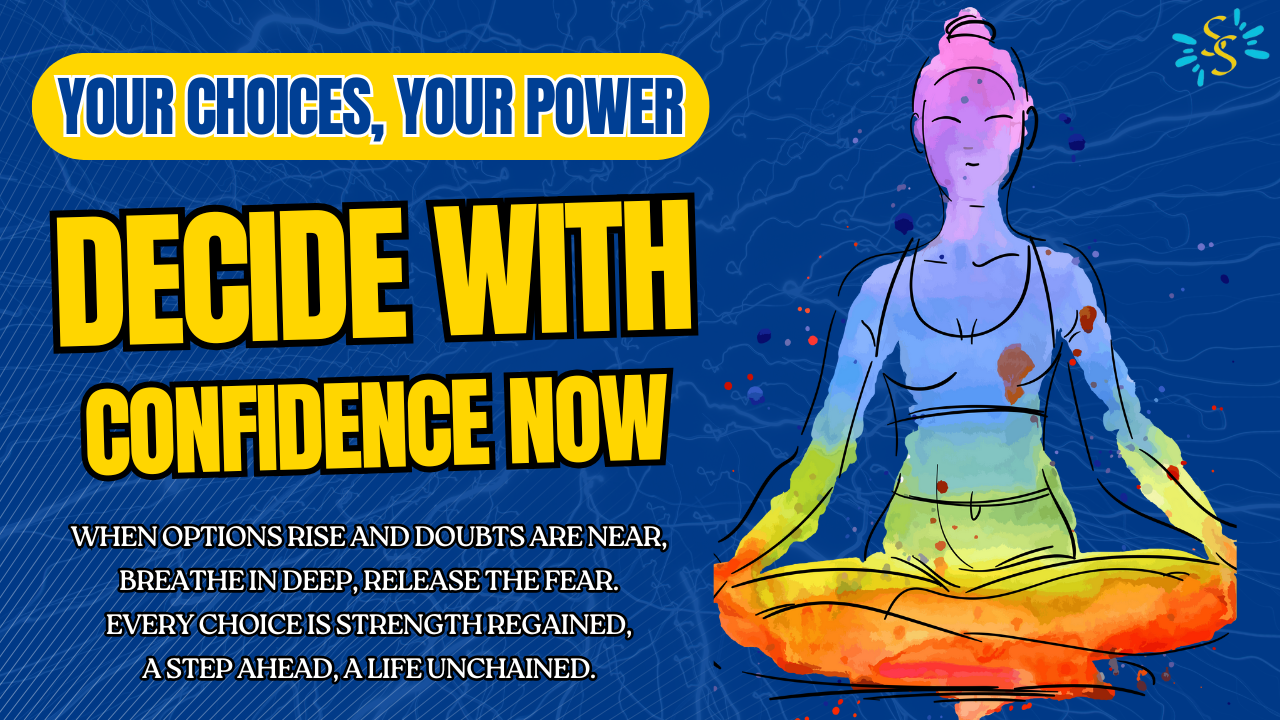Decision-Making: The Cure or Cause of Overwhelm and Anxiety
Have you ever felt paralyzed by choices, unsure of what to do next? Or perhaps making a decision brought relief and clarity, allowing you to move forward with confidence. Decision-making can be both the cause and the cure for overwhelm and anxiety, depending on how we approach it.
Let’s explore how the decision-making process can either fuel anxiety or alleviate it, diving into everyday scenarios, psychological research, and timeless wisdom from famous thinkers. By understanding the mechanics of decision-making, you can take control of your choices—and your mental well-being.
How Decision-Making Causes Overwhelm and Anxiety
The Root of Decision Anxiety
1. Too Many Options (Choice Overload)
Modern life offers endless options—from picking a Netflix show to choosing a career path. While having choices can be empowering, too many options can create “choice overload,” a phenomenon studied by psychologist Barry Schwartz in The Paradox of Choice. He found that more options often lead to indecision, regret, and dissatisfaction.
Real-Life Example:
Imagine scrolling through dozens of shows on a streaming service, only to end up watching nothing because you couldn’t choose. This is a classic case of being overwhelmed by too many possibilities.
Research Insight:
Schwartz’s research shows that limiting your options or setting clear criteria can reduce decision fatigue and increase satisfaction.
2. Fear of Making the Wrong Decision
Fear of failure, regret, or judgment often keeps people from making decisions altogether. This is called “decisional procrastination,” where avoiding a choice feels safer than risking a poor outcome.
Real-Life Example:
You’ve been offered a job in another city but hesitate to accept because of the uncertainty involved—what if you hate the new environment or struggle in the role? This fear-driven paralysis can lead to missed opportunities and lingering anxiety.
Quote Insight:
“Indecision is often worse than the wrong decision.”
—Tony Robbins
Avoiding a decision can create more anxiety than facing its consequences.
3. Perfectionism and Control
Perfectionists often struggle with decision-making because they fear anything less than a “perfect” choice. They try to control every variable, leading to endless research, second-guessing, and self-criticism.
Real-Life Example:
You’re planning a vacation but obsess over finding the “perfect” destination, accommodation, and itinerary. What was supposed to be an exciting experience becomes stressful and overwhelming.
Research Insight:
Psychologists suggest embracing a mindset called “satisficing”—settling for “good enough” instead of chasing perfection. Making a “good enough” decision can reduce stress and boost happiness.
How Decision-Making Can Cure Anxiety
While decision-making can create anxiety, it can also be the key to relieving it when approached mindfully. Here’s how:
1. Recognizing the Need for a Decision
Avoiding decisions often causes more anxiety than making them. Recognizing that a choice must be made is the first step toward gaining control.
Real-Life Example:
Your work-life balance is suffering due to constant overtime. Acknowledging that something needs to change—whether asking for fewer hours or finding a new job—is the first step toward resolution.
Quote Insight:
“The first step toward change is awareness.”
—Nathaniel Branden
Awareness creates the space to make thoughtful decisions rather than staying stuck in anxiety.
2. Gathering Information
Anxiety thrives on uncertainty. Gathering information helps reduce uncertainty and build confidence in your ability to make an informed choice.
Real-Life Example:
You’re unsure whether to pursue graduate school. Researching programs, talking to alumni, and exploring career paths can clarify your options, making the decision less daunting.
Research Insight:
Cognitive-behavioral therapists often recommend listing facts, pros, and cons to combat “catastrophic thinking,” where people imagine worst-case scenarios.
3. Evaluating Options
Evaluating options involves considering potential outcomes and consequences while accepting that no decision is risk-free. Thoughtfully weighing possibilities can ease anxiety by shifting focus from fear to problem-solving.
Real-Life Example:
You’re considering ending a long-term relationship but fear being alone. Evaluating your emotional needs, relationship dynamics, and future goals can help you make a decision based on clarity, not fear.
Quote Insight:
“The greatest weapon against stress is our ability to choose one thought over another.”
—William James
Focusing on what you can control reframes anxiety as an opportunity for growth.
4. Choosing and Acting
Action is the ultimate cure for decision-related anxiety. Even imperfect decisions bring closure, allowing you to learn, adapt, and move forward.
Real-Life Example:
After months of debating, you decide to pursue a career change. Taking that first step—whether applying for a course or connecting with mentors—shifts anxiety into empowerment.
Research Insight:
Neuroscientist Antonio Damasio found that action-based decision-making activates reward pathways in the brain, reducing anxiety and increasing motivation.
Practical Tips to Manage Decision Anxiety
-
Set a Time Limit: Give yourself a deadline to prevent endless deliberation.
-
Use the “5-5-5 Rule”: Ask yourself: How will this decision affect me in 5 minutes, 5 months, and 5 years?
-
Limit Options: Reduce decision fatigue by narrowing choices to a few meaningful options.
-
Practice Self-Compassion: Allow room for mistakes and learn from them.
-
Take Small Steps: Break big decisions into smaller, manageable steps.
Final Thought: Embrace the Power of Choice
Decision-making can either paralyze us with anxiety or set us free through action. By recognizing when a decision is needed, gathering relevant information, evaluating options, and acting with purpose, you can transform uncertainty into clarity and control.
As Søren Kierkegaard, the philosopher of existentialism, famously said:
“Life can only be understood backwards, but it must be lived forwards.”
Decisions shape our lives, even when the outcomes are uncertain. Trust the process, learn from every choice, and remember—you have more power over your future than you think.
Thanks for reading! If this guide helped you, don’t forget to like, share, and subscribe for more insights on navigating life’s most challenging decisions. See you next time!

